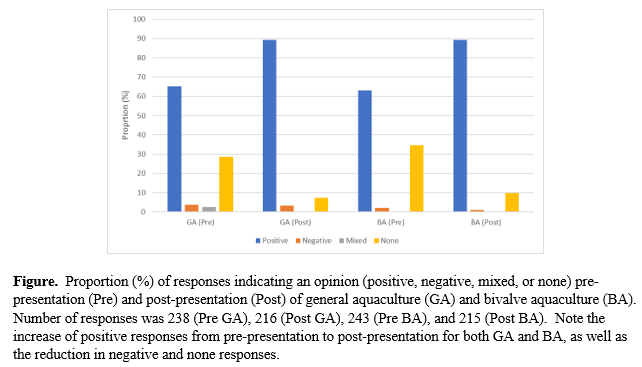CHANGING ATTITUDES FOR OFF-BOTTOM OYSTER AQUACULTURE IN TEXAS
Eight public meetings were held in coastal counties of Texas to identify through written surveys potential user conflicts and potential solutions to allow for off-bottom culture of oysters. A majority of respondents (67.6%) were generally familiar with aquaculture. Before the presentation (Pre), a similar majority had a positive opinion of general aquaculture (GA, 65.1%) and bivalve aquaculture (BA, 63.0%) as compared to a negative opinion of aquaculture (3.8%) or bivalve aquaculture (2.1%); the remainder indicated no opinion or mixed opinion (Fig.). After the presentation (Post), there was a large increase (~25% absolute value) in positive perception of both general aquaculture and bivalve aquaculture (Fig.). Much of the increase came from those that had no opinion initially, although there was also a reduction in those that initially had a negative opinion. A primary reason noted for a change to a positive opinion was the alleviation of a concern, many of which were environmental in nature. This change of opinion indicates the importance of reaching target audiences, especially those with mixed or no opinions, with information that assists in forming evidence-based decisions. It is key for ensuring that actions, such as oyster culture in coastal Texas, will be accepted by stakeholders and the community (i.e., social license to operate). This research project was supported by a Gulf States Marine Fisheries Commission award (ACQ 210-039-2017-TAMU) and was reviewed by the TAMU-CC Institutional Review Board.
